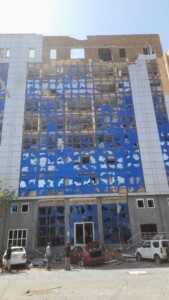UNITAMS head to Dabanga: Political cooperation needed to avert Sudan collapse
Volker Perthes, UN Special Representative for Sudan and head of the UN Integrated Transition Assistance Mission in Sudan (UNITAMS) told Radio Dabanga on Tuesday that “it is high time to put the interests of Sudan above personal, factional, partisan and regional interests, as the country is facing an imminent economic and security collapse”.
 Dabanga Sudan interviews Volker Perthes, September 6 (RD)
Dabanga Sudan interviews Volker Perthes, September 6 (RD)
Volker Perthes, the UN Special Representative for Sudan and head of the UN Integrated Transition Assistance Mission in Sudan (UNITAMS), said that the country is on the verge of economic and security collapse. He warned of dire consequences “if all do not cooperate to save the country”.
In an interview with Radio Dabanga in his office in Khartoum, of which the first part was broadcast yesterday, Perthes said that the political scene became more complicated following the coup d’état of October 25 last year, which negatively affected the economic, social, and security situation.
“It is high time to put the interests of Sudan above personal, factional, partisan and regional interests,” he said, and emphasised the need for the various parties in the country to cooperate, regardless of differences in viewpoints and interests. He urged all forces to sit with each other in dialogue in order to save the country.
The UN Special Representative described the mission’s relationship with the military as normal as “they represent the only authority in the country after the coup”. UN missions always have relations with the authorities of any country, including the military, he said
“No progress can be made without including the current authorities in the discussions on the transitional period. The power is in their hands and they are the ones who decide on the next political, social and economic steps,” he explained.
“We are not happy with the withdrawal of the military component from the dialogue with civilian groups, but at the same time the withdrawal launched a new dynamic, represented in several initiatives and dialogues between the various civil forces.”
He praised the three-day dialogue on arrangements for a transitional constitutional framework, organised by the Sudanese Bar Association (SBA) in August, and welcomed the attempts to merge the two political charters of the resistance committees issued in January and February this year.
Values
Perthes underscored that UNITAMS does not support any particular party in Sudan. “All civil parties have the right to play a role in the talks,” he said, and explained that mediators are often accused of being biased during the negotiation process.
He pointed to the basic values of the UN concerning human rights, peace, the Rule of Law, and sustainable development. “The mission's mandate, as stipulated by the UN Security Council, is related to supporting a political transition towards democracy under a civilian leadership.”
Therefore, UNITAMS is part of the Trilateral Mechanism, and works, together with the African Union and the Intergovernmental Authority on Development (IGAD), “for one strategic goal, which is the return of Sudan to a constitutional status and a civilian-led transition towards democratic rule”.
'We are not happy with the withdrawal of the military component from the dialogue with civilian groups, but at the same time the withdrawal launched a new dynamic among the various civil forces.' – Volker Perthes
Asked about the role of UNITAMS in the general elections, Perthes said he did not want to answer hypothetical questions. He confirmed the mission's support for the elections after the end of the transitional period agreed upon by the Sudanese, especially with regard to the training of young candidates.
The UN special envoy further explained that, compared with the UN-AU peacekeeping Mission in Darfur (UNAMID) which officially left the country on December 31, 2020, UNITAMS is a “small mission with big tasks”. The number of UNITAMS staff members does not exceed 220 people. Among this staff are 21 policemen, who’s role is to provide assistance to the Sudanese police.
The budget of UNITAMS in 2021 was $30 million. The mission has offices in Darfur and in Kordofan, and has recently opened an office in Port Sudan. UNITAMS however, cannot be present in all regions and states, he noted.

Violence
UNITAMS has condemned the excessive use of force, including the use of live ammunition against demonstrators, in various statements since the coup of October 2021. Officials of the mission have visited prisons, and have demanded the release of political detainees. The UN mission has provided briefings to the UN Security Council and Human Rights Council, as well as the international community on the developments in Sudan.
Perthes explained in the interview that the UN mission is also working with the Sudanese authorities to persuade them to stop the use of excessive force against protesters. He also lauded the appointment of an Independent UN Expert on Human Rights in Sudan following the coup. The expert, Adama Dieng, has visited Sudan in February and in June, and submitted his reports to the UN High Commissioner for Human Rights. Dieng is scheduled to pay a third visit to the country.
Juba Peace Agreement
Perthes further deplored the delay in the implementation of the Juba Peace Agreement, signed between the Sudanese government under the leadership of PM Abdallah Hamdok and the Sudan Revolutionary Front rebel alliance in the south Sudanese capital on October 3, 2020.
All provisions of the agreement must be implemented, not only appointments to positions, he stressed.
As for the return of the displaced to their places of origin, the UN representative pointed to the necessity to address the issues of the ownership of land and hawakeer (land traditionally used by a particular tribal group), and the integration, demobilisation and disarmament of the armed forces in the region. “The establishment of commissions [for these issues] is a sovereign affair of the state, but the mission is ready to cooperate and help.”
The head of the UNITAMS further criticised the “unacceptable delay in implementing the security aspects of the Juba Peace Agreement in Darfur. “Despite the establishment of ceasefire committees, the joint forces for peacekeeping and protection of civilians has not yet been deployed where they are needed most.”
Asked about the role of UNITAMS in protecting the people in Darfur, Perthes replied that the protection of citizens is the responsibility of Sudan. “We cannot carry out actions that lie within the jurisdiction of the state,” he explained. “There is no international mission that can replace the state.”
Transitional Justice
UNITAMS supports the transitional justice process with advice and technical assistance. “After a political solution has been reached, one of the first tasks of the new transitional government will be to work on the transitional justice file and establish the Transitional Justice Commission.”
The UN mission as well supports the Prosecutor of the International Criminal Court to Sudan, who, during his recent visit to Sudan, demanded the authorities in Khartoum to fully cooperate with the court in The Hague.
Perthes deplored the increase in violent tribal conflicts in the country and attributed this to “the absence of the state, and the politicisation of conflicts over land. The absence of the state's role in the fields of security, social peace, health, and education has caused the people to resort to their tribes and clans for protection, which has increased intercommunal tensions”.
Requested
On June 3, 2020, the UN Security Council decided to set up a UN assistance mission in Sudan, in response to an official request by the Sudanese government in February that year.
UNITAMS’ strategic objectives would focus on assisting Sudan in its transition towards democratic governance, providing support for peace negotiations, and bolstering efforts to maintain accountable Rule of Law and security institutions, the Security Council said in a press statement at the time.
The UN mission would provide technical assistance to the Constitution drafting process, supporting implementation of all human rights, equality, accountability and Rule of Law provisions in Sudan’s Constitutional Charter.
It would “support Sudan’s capacity to extend State presence and inclusive civilian governance, in particular by strengthening accountable rule of law and security institutions, and by building trust between State authorities and local communities”.
PM Hamdok explained at the time that Khartoum’s request for such a mission was based on two basic conditions: The ownership of the mission and the sovereignty of Sudan. “We requested assistance in the form of a mission that helps us in addressing transition issues, chief among which is financing the implementation of the peace agreements that are imminent, for instance the establishment of schools and hospitals, something similar to the Marshall Plan,” he stated.











 and then
and then